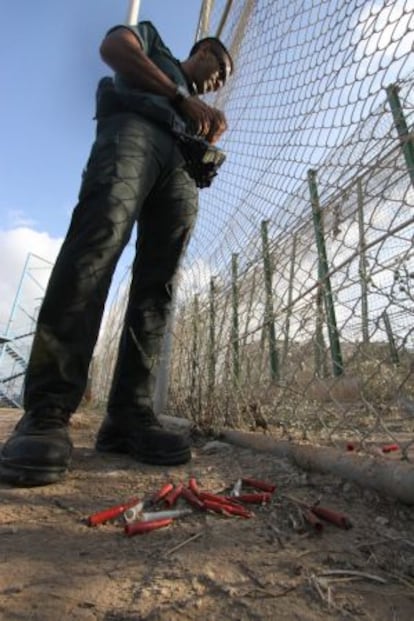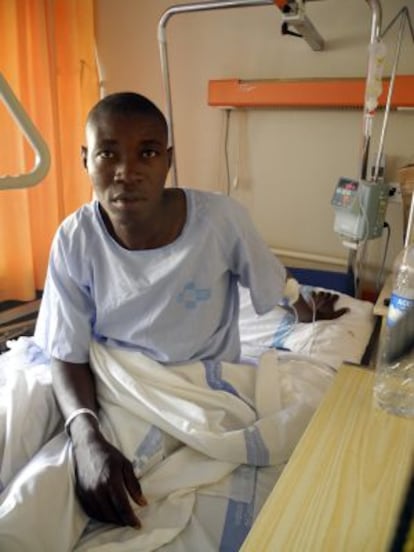"This is hand-to-hand combat"
Immigrants and security forces clash almost every day along the Melilla border 1,700 sub-Saharans have got past the guards to enter Spain this year

Nothing is working to stop the mass attempts by desperate immigrants to jump the border fence between Morocco and the Spanish North African exclave of Melilla. Only the daily hand-to-hand struggle between security forces and sub-Saharan would-be immigrants can frustrate their attempts to cross the frontier. Last week a hundred illegal immigrants managed to reach Spanish soil in the exclave. But 500 others were chased away by the blows of the border patrols.
The leap over the fence represents the moment in which a migrant invests all their hopes of reaching Europe after a journey of months or even years from sub-Saharan Africa. "You have to be very brave, put yourself in the hands of God and jump," says Solo Solimon, a 20-year-old Cameroonian who has not yet got used to life in Melilla, despite having already spent five months in the city.
So far in 2013 1,700 others like him have also arrived there. "If we go on at this pace, it will be between 15 and 20 percent more than last year," says the government delegate in Melilla, Abdelmalik El Barkani.
Solimon repeats the luck he had getting off the infamous Mount Gurugú in Morocco - the place where hundreds of sub-Saharans live in misery while they prepare for their jump - just two weeks after arriving. The migrants head down to the fence in the early hours. If there are a lot of them, the Civil Guard, which patrols the border in groups of 30 officers working in eight-hour shifts, detect their movements on their security cameras from the time they come out of the forest, around eight kilometers from the fence. They immediately alert the Moroccan border police and wait for their arrival. But if they surprise them at the fence, the reaction time is "minimal," they say. Barely a minute.
After jumping, I spent a day and a night in a pipe close to the airport"
"If the two ranks of Moroccan Gendarmes pass by [Rabat has 950 officers dedicated to safeguarding the border], they throw stones to disperse us and have more space to escape after the jump," says one civil guard with several decades of experience.
"If the Moroccans catch you, they give you a beating and break your legs. If the Spanish catch you, they hand you back," Solimon explains. It's a maxim with which they are all familiar. That's why they hide where they can after jumping: "I spent a day and a night in a pipe close to the airport. I wasn't hurt, but I was very hungry," Solimon says.
Spain is grateful to the Moroccan forces' commitment to defending the border, which means an increase in repression for the immigrants, especially in the last two months, following King Juan Carlos's visit to his Moroccan counterpart Mohammed VI, according to both civil guards and immigrants.

In June the Spanish Interior Ministry beefed up its defenses with a helicopter that patrols the border each night and 25 riot police. "Hunger has no borders," says an agent.
"This is hand-to-hand combat," says another.
Last week 400 illegal immigrants were arrested on the Moroccan side and 18 were hospitalized on Friday in the province of Nador, which borders Melilla, according to data from Rabat, though the hospitals talk about dozens. Those arrested wait in the yards of institutions to be taken to the border city of Oujda, to be expelled to Algeria, from where they mostly begin a 170 kilometer journey back to Melilla before trying again.
The 10-kilometer-long border perimeter comprises three layers of six-meter-high wire mesh. The first, slightly inclined to the Moroccan side, has an upper segment that falls down when the immigrants grab on to it, which slows them down. Between this and the second fence is a web from which it is very difficult to escape if you fall into the trench, though what they try to do is go over the top of all three fences and then make a run for it. "They run like possessed souls," says another guard, "and with great violence so we don't capture them." This year has produced the first death on the Spanish side since 2006. The cause was respiratory failure, according to the autopsy.
Unlike Ceuta, Spain's other exclave in North Africa, Melilla is relatively close to Algeria and far from the Spanish mainland by sea, which are the main reasons why the sub-Saharans try to cross by land rather than by water, even though it is considered more dangerous. Crossing the border in the false bottom of a car costs between 3,500 and 4,000 euros and a boat crossing costs between 500 and 1,000. Trying your luck at the fence is free. The youngest guys - their average age is under 25 - take the risk. "Suffering like this is just for us," explains 21-year-old Sangare Gausu, who still carries the cut he suffered on his left foot when he leapt the border last Wednesday. "We cannot let women climb the fence and we always find a way of helping them pass in another way."
They run like possessed souls, and are violent so we don't catch them"
Scaling the fence means having to take off your shoes. Putting your toes into the gaps allows you to climb faster and not slip, though of course then you have to make your escape barefoot.
Amadou Colimali, 30, broke his shin and calf bones during his escape and remains in hospital. From Mali, he had already spent six months on Gurugú after jumping from one truck to the next to travel the 3,200 kilometers from his hometown of Mopti to Oujda. He knew he had to get across the fence urgently as winter is too tough on the mountain.
Spain thinks between 500 and 600 remain in those forests, while the Moroccan authorities put the figure at over 1,700. The recently arrived immigrants believe there are now just a few hundred of them waiting to take the step, after a very tough summer of police repression. "They burn our things and steal our money," they say. "We just want to get out of there."
Tu suscripción se está usando en otro dispositivo
¿Quieres añadir otro usuario a tu suscripción?
Si continúas leyendo en este dispositivo, no se podrá leer en el otro.
FlechaTu suscripción se está usando en otro dispositivo y solo puedes acceder a EL PAÍS desde un dispositivo a la vez.
Si quieres compartir tu cuenta, cambia tu suscripción a la modalidad Premium, así podrás añadir otro usuario. Cada uno accederá con su propia cuenta de email, lo que os permitirá personalizar vuestra experiencia en EL PAÍS.
¿Tienes una suscripción de empresa? Accede aquí para contratar más cuentas.
En el caso de no saber quién está usando tu cuenta, te recomendamos cambiar tu contraseña aquí.
Si decides continuar compartiendo tu cuenta, este mensaje se mostrará en tu dispositivo y en el de la otra persona que está usando tu cuenta de forma indefinida, afectando a tu experiencia de lectura. Puedes consultar aquí los términos y condiciones de la suscripción digital.








































